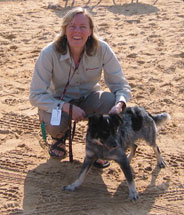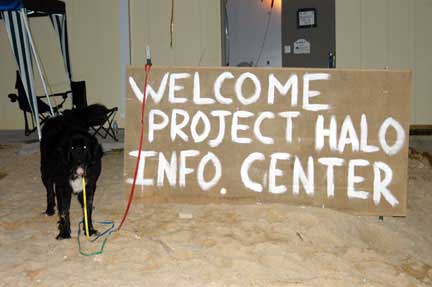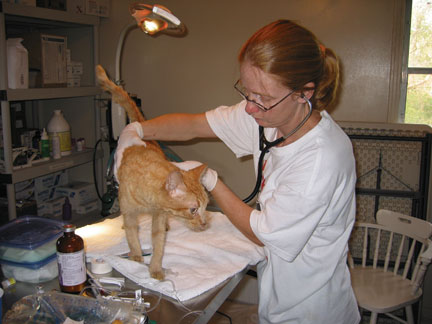
|
 |
Laura and rescued friend.
Photo courtesy of Laura Guimond |
Nothing prepares you for the sight of Gulfport,
Mississippi’s
coastline today. Wiped clean of all buildings by a 27-foot storm surge,
the only sign of its former life are the surreal drapings of sheets
entangled in upturned trees. So it’s no wonder that when I saw
a sign of hope—“Animal Shelter” spray-painted on
a wooden panel, I swung over to investigate. Just off Highway 49 in
Gulfport, Project HALO (Helping Animals Live On)—a nonprofit,
no-kill organization that rescues homeless, stray and unwanted dogs
and cats—had set up camp. Though based in Charlotte, NC, the
dedicated folks at Project HALO drove down to Mississippi in early
September to help animals impacted by Hurricane Katrina. Then Hurricane
Rita hit and they had even more work—and animals—on their
hands.
In collaboration with national groups and the local Humane Society
of Southern
Mississippi, Project HALO offers a much-needed service—fostering cats and
dogs surrendered by residents who have been displaced, lost virtually everything,
and are no longer able to care for their animals. They also run missions of mercy
to rescue animals slated to be put down. On the day of my visit, the team had
just driven four hours to Lafayette, Louisiana, to pick up animals who had ended
up in the local shelter—thanks to Hurricane Rita—and who, but for
Project HALO’s intervention, would have been euthanized that night.
As part of a long-term commitment to help the Humane Society of Southern Mississippi
address the influx of critters needing care, recover from their losses—of
staff, property, and local population—and move towards a no-kill policy,
Project HALO is looking for responsible no-kill shelters willing to take in some
of these animals.
They are also looking for self-sufficient volunteers to spend five minutes, five
hours or five days helping with dog walking, cat comforting, kennel cleaning,
etc. at the Gulfport shelter. When I stopped by they were in good spirits but
very tired and clearly in need of additional caregivers. They immediately handed
me a leash and a blue heeler and put me to work!
In addition to assistance with animal care, volunteers are needed to transport
much-needed supplies and food all over Mississippi.
If you have some time to give, come on down to Gulfport and help Project HALO
bring hope to hundreds of dogs and cats.
Laura Guimond works for Mercy Corps, an international humanitarian aid agency
based in Portland, Oregon. She was recently in the Gulf States working on programs
for children and teachers affected by the hurricanes as well as volunteering
with animal rescue groups. To learn more about Project Halo visit www.projecthalo.net.
To find out about volunteer opportunities email volunteer@projecthalo.net. To
foster or adopt rescued animals in need of a good home go to www.petfinder.com/shelters/projecthalo.html.
|
Alley Cat Allies
 |
Photo by Laura Guimond |
Estimates of the number of stray and feral cats
in the United States range from 10 million to over 50 million. Whatever
the
actual number, it surely
went up after Katrina hit. Along with the thousands of cats already free-roaming,
hundreds of house cats took to the streets seeking refuge from the storm.
These cats banded together in groups (or colonies) almost anywhere dry—behind
restaurants and shopping malls, under houses, in empty fields or lots,
even beneath dumpsters.
One organization in particular, Alley Cat Allies, stepped up to the plate
offering
an emergency shelter and hands-on care to the feral—both old and new—feline
survivors of Hurricane Katrina. The need has been and continues to be massive.
Alley Cat Allies has established a base camp and emergency cat shelter in Bogalusa,
Louisiana, and rescue teams have worked tirelessly feeding and trapping cats
in the areas affected by Katrina. They are also working with local caregivers
and rescue groups to help rebuild rescue programs and develop trap-neuter-return
programs.
What You Can Do
Alley Cat Allies needs your help immediately and they expect the need to last
till at least the end of the year. They are in desperate need of people with
experience in veterinary medicine, animal care, rescue operations, or computer
skills. But anyone willing to be flexible, take on a variety of different tasks,
and who does not mind getting dirty could lend a much-needed hand. Volunteers
for the Bogalusa facility should bring their own tents and should be able make
a five to seven day commitment. Foster homes, barns, and no-kill shelters located
throughout the country willing to take in cats are also on high demand. And check
out the Alley Cat website for a detailed list of items to donate. To find out
how to help, contact www.alleycat.org or (240) 482-1980.—K.A.M.
|



